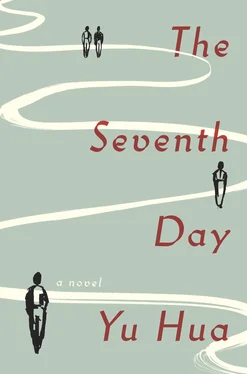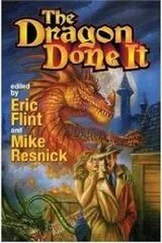After crossing the frontier between life and death, Li Yuezhen stepped onto a stretch of fragrant grass. The green grass rubbed the necks of the twenty-seven babies crawling along behind, and the ticklish sensation made them giggle. Where the grass ended, a gleaming river flowed. Li Yuezhen waded into the river, which slowly rose to the level of her chest, then slowly fell until it lay beneath her feet, as she arrived at the other bank. The babies paddled on the surface of the water, spluttering as they made the crossing, the sound of their little coughs carrying to her until they reached the bank. As they entered a forest, Li Yuezhen began to sing a song, and the babies behind sang along with her. She stopped, but they did not, and their nightingale-like refrain continued to waft among the trees.
“Your father was here,” Li Yuezhen said to me. “Yang Jinbiao was here.”
I looked at her in wonder.
“He had to travel a long road to get here, so he was very tired,” she said. “He lay down here for several days, thinking of you the whole time.”
“Where did he go after leaving me?”
“He got on the train and went to the place where he once abandoned you.”
That last evening’s conversation with my father had always been imprinted on my mind. We squeezed onto the narrow little bed in the room behind the shop, and the streetlights outside seemed ready to drift off to sleep as the night breeze caressed our window. It was the first time my father had wept in front of me. He told me how, for a young woman’s sake, he had abandoned me on a rock in an unfamiliar town. He described the rough texture of the rock face and the smoothness of its upper surface. It was on that terrace that he had put me, although subsequently he would reproach himself for his heartlessness, over and over again. When my father left me after that conversation more than a year ago, it never crossed my mind that this was where he would go.
My father had put on his brand-new railroad uniform, the newest set of clothes in his possession, which he’d never been able to bring himself to wear before. Dragging a weak and failing body, he boarded the train and squeezed his way to his seat. No sooner had he sat down than the train started to move. Watching the platform slowly recede into the distance, he suddenly became aware that he did not have much time left and did not know if he would ever be able to see me again.
My father told Li Yuezhen that he had not slept a wink that last night we were together, but instead listened continuously to my rhythmic breathing and occasional snoring. In the middle of the night there was a spell when I made no sound at all and he got worried, so he stretched out a hand and patted my face and neck, waking me. I propped myself up and looked at him, and he closed his eyes and pretended to be asleep. He said that in the darkness I patted him and carefully put his arm inside the quilt.
I shook my head. “I don’t remember any of that,” I told Li Yuezhen.
Li Yuezhen pointed at the grassy patch under the trees. “He was lying just there as he told me all this.”
My father had a fairly clear idea of where to go, but it wasn’t easy to find the copse of trees and the dark rock, and he never found the stone-slab bridge and the dry riverbed. He remembered that on the opposite side of the bridge there ought to be a building, a building with the sound of children singing, but he found neither the building nor the singing. Everything had changed, he told Li Yuezhen, even the train. The train that he and I took that year had pulled out of the platform at dawn and did not arrive at the town until midday. Now the train that he alone took still left at dawn, but reached that same place just over an hour later.
“Did you still remember the location?” Li Yuezhen asked him.
“I did,” he said. “Riverside Street.”
He left the train station in the morning sunlight, among travelers who carried bags over their shoulders or pulled suitcases behind them in such a rush it was as though their lives depended on it. He was carrying neither bag nor suitcase, but his laboring body felt heavier than any piece of luggage. As he plodded slowly toward the station exit, his two hands lacked the energy to swing loose and hung almost motionless by his side.
He stood in the square in front of the station and in a feeble voice asked directions from the healthy bodies rushing past him. Of the first twenty people he approached, only four said they were locals. He asked them how to get to Riverside Street. The three younger people had no idea where Riverside Street was. But the fourth, an old man, recognized the name and said my father needed to take a No. 3 bus. My father wearily boarded the bus, and in a town where he knew no one he went looking for the site of my abandonment.
“Why did you want to go there?” Li Yuezhen asked him.
“I just wanted to sit on that rock for a bit,” he replied.
It was afternoon by the time he found the spot. He was well-nigh exhausted by the trip on crowded public transport. After he got off the first bus, he had sat down by the side of the road for a good long time before he could summon the strength to board the second. The third bus dropped him off three hundred yards from Riverside Street. To him, that walk was so arduous, it could just as well have been three thousand yards. He could move forward only with difficulty, his steps ponderous, his feet as heavy and clumsy as two rocks. After walking five or six yards, he had to lean against a tree to rest for a little. He noticed a snack shop by the side of the road and felt he ought to eat something, so he sat down on one of the stools placed on the sidewalk outside the shop, propping himself up by putting both hands on the table. He ordered a bowl of dumpling soup, but after three mouthfuls he had to throw up — into a plastic bag he had brought along for the purpose. The people sitting next to him hurriedly carried their bowls into the shop, and he apologized to them in a weak voice, then went on eating, continuing to vomit at intervals. When he finished eating, he felt he’d eaten more than he’d vomited and his body now had some strength, so he lurched to his feet and tottered the rest of the way to Riverside Street.
“It was all tall buildings there,” he told Li Yuezhen.
The stream and the stone-slab bridge of yesteryear were no more. He did hear children, but they were no longer singing. They were yelling with excitement on a playground slide, as their watchful grandparents chatted. The area was now a housing complex, and the pathways between the high-rise buildings were like narrow cracks through which vehicles and people had to squeeze. He inquired as to the whereabouts of the river and the bridge, but the residents had all moved here from somewhere else, and according to them there was no river and no bridge, and there never had been. “Is this Riverside Street?” he asked, and they said it was. “Was that always its name?” he asked, and they said they thought it was.
“So it was called Riverside Street, even if there was no river?” Li Yuezhen asked.
“The place name hadn’t changed, but everything else had,” he replied.
In a feeble voice my father continued to ask about the little copse and the dark rock among the grasses. One person told him that there was no copse but there were grasses, in the park next to the housing development, and there were rocks among the grasses. My father asked how far it was to the park and the man said it was close by — just two hundred yards away — but those two hundred yards were for my father another strenuous journey.
It was dusk by the time he reached the park. The lingering rays of the setting sun illuminated a grassy lawn, and several rocks scattered across the lawn and jutting out of it caught the warm colors of the setting sun. He searched among these rocks for the one he carried in his memory and felt that the dark rock among them looked a lot like the one that I had sat on so many years earlier. He slowly walked over to it and wanted to sit on it, but his body would not obey instructions and kept slipping off, so he could only sit down on the grass and lean his back against the rock. At that moment he realized he lacked the strength to stand up again. His head flopped against the rock and he watched in a powerless daze as a vagrant wearing shabby old clothes rummaged around in a nearby garbage can. The man pulled out a Coke bottle, twisted off the cap, and emptied the remaining drops of soda into his mouth. The vagrant shook the bottle a few more times before tossing it back into the garbage can. Then he turned around and stared at my father like a hawk. My father turned his head away, and when he looked up he found the vagrant was sitting on a bench by the garbage can, his eyes still fixed on him — fixed on his brand-new railway uniform.
Читать дальше











